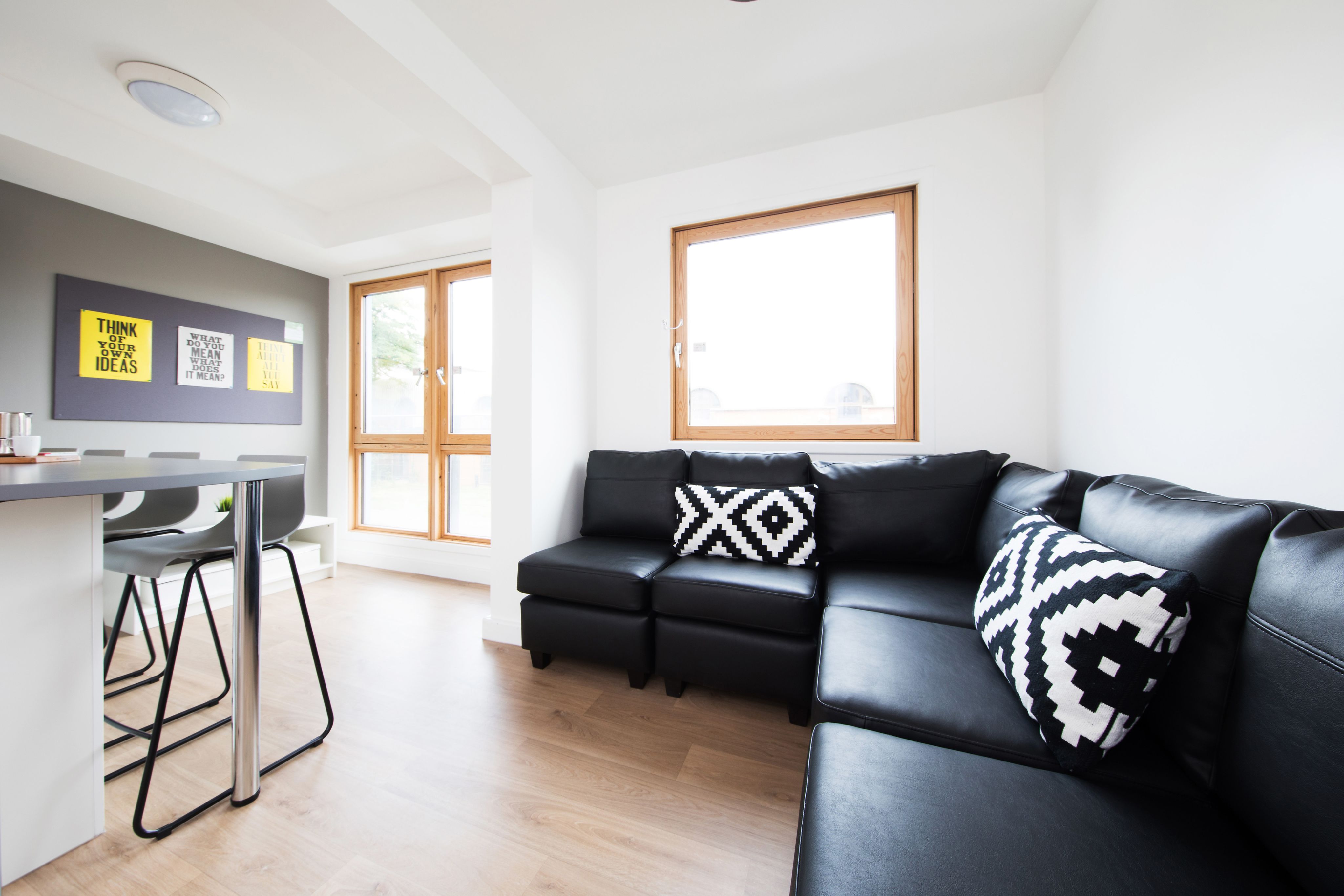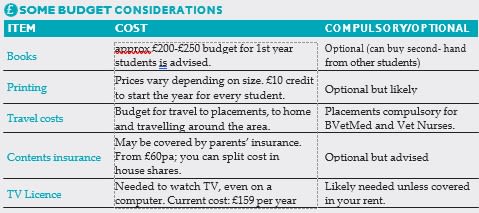Settling In
Links and information to help you settle into life in the UK.

Groceries
The RVC does not recommend any specific retailer, the text below is for information purposes only.
Food
There are a number of supermarkets in London, the main ones being: Sainsbury’s, Tesco, Waitrose, M&S Simply Food, Morrisons, Asda (the UK subsidiary of Walmart), Co-Op, Lidl and Aldi.
Sainsbury’s, Lidl, Waitrose and M&S have branches in Camden, located in close proximity to the RVC Campus. The RVC shuttle bus in Hawkshead also stops at a big Tesco as well as a Sainsbury's at Potter's Bar station. There is a Whole Foods near Camden Town tube and you can also find many specialist stores offering country-specific items in central London (see the Home Comforts section below).
Online Grocery Shopping
Most of the big supermarkets and some of the specialist grocery shops offer online shopping with delivery directly to your door, either for a small fee or for free if you spend a certain amount. Please note that you will normally require a UK mobile number to register your online account, but you can find more information on individual supermarkets' websites.
Home Comforts
You may be worried that being away from your home country will mean you miss out on home comforts such as your favourite herbal tea or brand of cereal. However, given that London is home to people from all over the world with over 300 languages spoken, you should be able to find shops that stocks food/goods from your home nation. Below is a list of a few suggestions for those who want to seek out a taste of home, please note that prices will often be much higher than you are used to back home as most of these products need importing from overseas:
USA: The American Food Store in Ladbroke Grove and Panzer's Deli in St John's Wood are great places to find real American products, especially if you need to stock up on Thanksgiving supplies.
Canada: Get your favourite branded Canadian food stuffs delivered to you from Skyco.
Chinese: Loon Fung in China Town near Leicester Square has got Chinese staples and a decent array of fresh vegetables.
Korean: Oseyo on Camden High Street has a selection of Korean groceries and you can also order them online from H-Mart. You can also check out New Malden in South London which boasts the UK's largest Korean community. The area hosts shops such as Kimchi Mal and Hyun's Bakery.
Japanese: Try the Japan Centre near Leicester Square for a wide selection of Japanese groceries, also available to order online.
African and Caribbean: London has a large African and Caribbean community and food items are fairly widely available in mainstream supermarkets. For more specialty shopping, we can recommend markets in Brixton and , as well as Ridley Road Market by Dalston Kingsland station (a short ride on the Overground from Camden Road station), where you will find an array of food from Nigeria, Ghana, Jamaica, Trinidad and many other countries.
South Asian: With London having a large South Asian community from amongst other places India, Pakistan, Bangladesh, Sri Lanka and Mauritius, South Asian food goods are fairly easy to find even in mainstream supermarkets and are evenly distributed across the city. Next to Euston station, Drummond Street has a selection of both shops and restaurants.
Middle Eastern: In Kentish Town which isn't too far from the Camden campus, you will find Phoenicia Mediterranean Food Hall which has groceries from Lebanon, Turkey, Cyprus and Greece. On Edgware Road you'll find a number of Middle Eastern grocery shops, amongst others Green Valley.

Shopping
The RVC does not recommend any specific retailer, the text below is for information purposes only.
Homeware
Wondering where you can get hold of all the essential items for your new room? The shops below are where you can purchase bed linen, towels, furniture and other necessary homeware items. Some of the bigger Sainsbury’s, Tesco, Waitrose, Marks & Spencer, Morrisons and Asda supermarkets also sell homeware items and furniture.
Argos: Comprehensive catalog shop; items can be collected from one of their many stores (including Camden High St) whilst others are only available for home delivery.
IKEA: The nearest branch is in Wembley.
Tiger: Sells affordable smaller items of homeware, nearest branch on Tottenham Court Road.
Amazon: You can get a discounted Amazon Prime account using your student email, remember to also use the UK Amazon site or you may be charged a high delivery cost if ordering from outside of the UK.
John Lewis: A nationwide department store that delivers, the nearest store is on Oxford Street. A nationwide department store that delivers, the nearest store is on Oxford Street.
Toiletries/Pharmacy items
You can get hold of many items in supermarkets, but for a wider range of products or more specific health/beauty items, try Boots (like CVS) or Superdrug which both have branches on Camden High Street.
Clothes
You will be spoilt for choice for clothes shops in London and prices are often cheaper than elsewhere once you're familiar with the brands. Oxford Street is one of the best places for clothes shopping in London (Primark is a good option for cheap items to tide you over when you first get here). A little further afield, you can find Westfield, London's largest shopping mall - there's one in East London and one in West London. There is also a huge range of clothing and other items available from the world famous Camden Market where, at many stalls, you can haggle.
Books
Foyles and Waterstones are big book seller who also stock academic text books. If you prefer to buy from smaller, independent book sellers then try Bookshop.
Student Discounts
Once you have your student ID card, you can take advantage of discounts in a number of shops (and restaurants, cinemas and theatres too, for that matter!). Lots of shops, entertainment (cinemas, bowling alleys, bars, restaurants, exhibitions and retail outlets in the UK offer a 10%+ student discount so it’s certainly worth asking when you pay, whether they offer a student discount, then just flash your ID card to get your money off. If you sign up to the NUS extra scheme and myunidays.com to receive student discounts online.
Money/budgeting /moneysaving tips
Student discounts will definitely make your money go further. There are several discount cards that are worth looking into. Some you will need to pay for, so consider whether you will use them before buying.
- Student Oyster Card gives 30% off the price of adult-rate Travel cards and Bus & Tram Pass season tickets to students living in a London Borough (https://tfl.gov.uk/ campaign/student-travel). Note: Student Oyster applications can only be approved by the RVC after you have attended enrolment.
- 16-25 rail card (all students in full time education also eligible) Get 1/3 off most rail fares. It can also be used with a Student Oyster Card for more discounts. (https:// www.16-25railcard.co.uk)
- NUS Card (TOTUM Card); Over 200 discounts and 42,000 international discounts with 1 year free ISIC (https://www.nus.org. uk/en/nus-extra/international-discounts).
SUPPORT
If you have questions or concerns about finances/funding, debt, benefits or your budget for the year ahead you can contact our Student Money Adviser (see the Learning and Wellbeing section for details).


Mobile (Cell) phones
London is one of the most well connected cities in the world and you will find it really easy to stay in touch with your family back home and with your new friends in the UK.
Mobile phones in the UK
Thanks to London’s excellent mobile phone coverage, there are plenty of providers and different packages you can choose from. There are three ways in which you can pay for a mobile phone service in the UK:
Pay monthly - This is the least flexible option and you will be tied into a contract of between 18 and 24 months. If you choose a pay monthly deal and leave before your contract has ended you will almost certainly be charged for early disconnections. These will often include deals to get select countries included in your standard allowance so, for example, you can use your phone in the USA at no extra cost.
Pay as you go (PAYG) - PAYG is very popular amongst students. You buy a handset and then pay in advance for a set amount of calls and texts. This usually is not the cheapest option, but it does offer great flexibility and is the best way to keep track of how much you spend.
SIM only - These packages are a halfway house between PAYG and contract phone. You will be provided with a SIM card but no phone, and you will only be committed to a rolling 30 day contract.
There are currently four major mobile phone providers in the UK: 3, O2, EE and Vodafone. However, some of the smaller providers, such as Tesco Mobile and Giff Gaff are also worth checking out. Each provider has its own range of packages so it is important to shop around when you are deciding on the best option for you.
The first thing you need to consider is whether you actually need a new phone handset. If you don’t, you could make a big saving by opting for a SIM only deal. If you have brought your phone with you, it may be worth continuing to use that phone but with a UK SIM card. You may need to get your phone unlocked as some phones are locked to the network from which the handset is purchased. Speak to your provider about this – some providers may charge a fee to unlock your phone. Alternatively you could buy a new phone handset in the UK.
Before deciding, take a look at an Ofcom approved price comparison site, like MobilePhoneChecker or HandsetExpert – these are easy to use sites where you can compare deals across several networks and compare the different services (pay as you go, pay monthly and SIM only). Take a look – you’ll see you can often get a SIM only deal for half the price of a pay monthly contract!
The Carphone Warehouse is a shop in the UK that caters for all mobile networks so may also be a good starting point for comparing the various options.
When you are researching your mobile options, make sure you take into account whether they offer an international calling plan if you expect to make regular international calls. Many providers will offer this as an extra service on top of a monthly subscription, but some are available to PAYG customers too.
Setting up a mobile phone contract
Before you are able to set-up a phone contract you will need a UK bank account. This is in order for your bill to be paid via direct debit. The process of opening an account can take time. Therefore, it might be worth buying a PAYG SIM for your first weeks at the RVC. Be sure to check that your current smartphone is unlocked or that it will work with UK networks.
Advice from a fellow international student:
I'd recommend people seek a phone plan ahead of time. If you are able, you can even keep your existing phone and get a new SIM for it. You need a UK debit card (not just an account) to set up most phone plans, and a UK number is required for setting up a lot of services. I'd definitely recommend just getting a pay-go SIM from somewhere like Tesco or Sainsburys. Even Superdrug carries them! For students coming from the US who want to maintain an affordable US number as well, Google Fi is truly a lifesaver.

Climate
Although the UK does not have the most extreme weather, it does have changeable weather and often in one day will see sunshine, rain and wind. Whilst London weather is fairly temperate by UK standards, if you travel north for placements, you should experience more snow, rain and wind, especially in Scotland. When preparing for life in the UK, it is important to consider the clothes you will need to bring with you to cope with the changeable nature of the British climate. It is recommended that you have clothes that can be layered, a good waterproof winter coat and waterproof, hard-wearing shoes.
Weather
In winter the average is 2-7 degrees Celsius (36–45 degrees Fahrenheit), but temperatures can drop to just below 0°C (36F). You are unlikely to see much snow in London and therefore may be baffled by what can go wrong with transport when it does. Equally, the UK isn't known for its incredible insulation so top tips are: Scarves go a long way, and hot water bottles are great when at home.
The average summer temperature is 11-20°C (52-68F). However, it can easily get above 30°C (86F) and this remains a country not built for any temperature outside of the teens so it can feel hotter than the same temperature at home. Carry water with you (especially on the tube) and do what everyone else does which is find to your own patch of green outside whether in a park, graveyard or a random step somewhere.
For our US friends, hopefully you'll become old hat at using Celsius soon enough, but until then:


